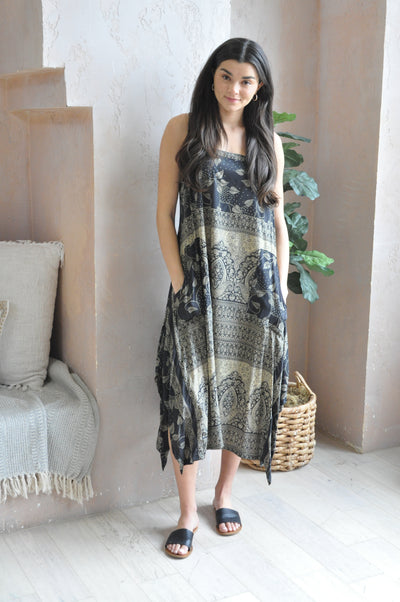Collaborating with good people who are doing good things.
Sometimes writing blog posts we need to be fun and creative, but also educational. So we’ve teamed up Mathilde from Sustain Your Style to communicate our thoughts on what we feel is better choice for the environment when purchasing fashion. It's a game of 'would you rather'.
Let's start with some basic information to reference as you play. Definitions of terms that are thrown around often, but not always explained.
Up-cycled. The practice of refashioning pre-loved textiles into new fashion has been around for quite some time. Guru barters with women in Indian villages exchanging everyday essentials for their previously loved saris, which are then upcycled. This upcycling practice has also been become popular with many other textiles including denim.
Sustainable. Webster's dictionary defines sustainable as “capable of being sustained”. In the fashion world that means textiles that can be produced without damaging the environment.
Recycle. As it relates to the fashion industry, recycling is the process in which any textile (damaged, new, synthetic, or natural) can be broken down in a textile recycling facility and turned into anything from new recycled textiles to rugs.
Compost. As it relates to the fashion industry, compost would mean any textile that can go into your compost bin and will break down naturally there.
Here we go!
Would you rather: repair your damaged clothing or recycle it?
Ofra - Though I do like both options, I feel strongly that the first resort before recycling any textile is repairing it. Granted some damages are beyond repair. However, a broken zipper, ripped seam, holes in the under arms (where most people do not look closely) can all be taken to a seamstress and repaired. In some cases, you can alter a maxi dress into a shorter dress if it has damage that cannot be repaired. We just need to be more creative.
The other reason why I favour repairing is because it is far less expensive than replacing. Repairing also allows you to avoid purchasing another item that has used water, chemicals and energy made in a country that likely does not have plentiful resources.
Mathilde - Although I also favour repairing damaged clothes, in some cases, our clothes are too destroyed, faded or smelly to be kept. I think it is very important that the industry and the governments develop better ways to collect and recycle clothing. Today, most discarded clothes end up in the general waste and then in landfills and take forever to decompose.
Would you rather: compost your clothing or purchase quality synthetics that can last a lifetime?
Ofra - Composting would be my choice. Products that can be composted are not inferior in quality. I believe that natural fibres that have no synthetics in them and are not dyed with chemicals should go into a compost bin rather than a landfill ONLY when their lifecycle ends - which means they can last a long time before that!
If it cannot be repaired, or given away and there is no other alternative I would prefer to have the textile naturally decompose in my compost bin and eventually be used for natural gas or fertiliser (depending on what your country is using green bin waste for).
I also like composting because it is a better alternative to landfills, which is where synthetic products eventually go. In landfills textiles are covered by layers of waste and won't have access to the elements and sun to help it decompose naturally. I would also pay a higher price for an item that I know can be composted at the end of life.
Mathilde - I think when possible, natural fibers should be favoured because they are more biodegradable in both landfills or in compost facilities. Now, I also believe that not many of us can have our own compost or live in a place where organic wastes are collected and composted in industrial compost plants. So, this solution unfortunately wouldn’t work for everyone.
Besides, some clothes such as waterproof outdoor gears last longer and are technically more effective when made in synthetic material. In those cases, it probably makes more sense to choose synthetic material, still preferring second-hand or recycled material and making sure it doesn’t end up in a landfill at the end of life.
Would you rather: upcycle your clothes or swap them?
Ofra - Naturally I am partial to upcycling as it’s a big part of what we do at Guru. It diverts textiles away from our growing landfills. It also allows buyers to purchase new styles that don’t damage the environment through a dirty production process heavy in chemicals and water usage. Upcycling also offers consumers unique pieces. It has been suggested that unique pieces are likely to be worn more and passed along, therefore avoiding trips to the landfills.
Mathilde - Upcycling is a great option to give another life to clothes, but it takes quite some creativity, design and sewing skills which are not always available. Swapping clothes or buying second hand allows us to re-use them as they are without the need of re-designing them.
Would you rather: only buy sustainable or never buy new clothes again?
Ofra - Tough choice. I would have to say buy sustainable. The consumer can make a statement with the dollars they spend. By choosing to buy sustainable, a statement is directed to fast fashion enterprise. Purchasing sustainable products also sends a message to the brands and the stores carrying them that there is a demand for their eco-friendly products. The consumer message will change the landscape of production. More and more manufacturers will take note and change their practices, eventually making this decision for us.
Mathilde - In general, I would say “never buy new clothes again” because I believe there are enough clothes already produced to dress the world population for the next 100 years. However this is not really possible. We will always need some new clothes, for example, underwear or a little treat every now and then.



